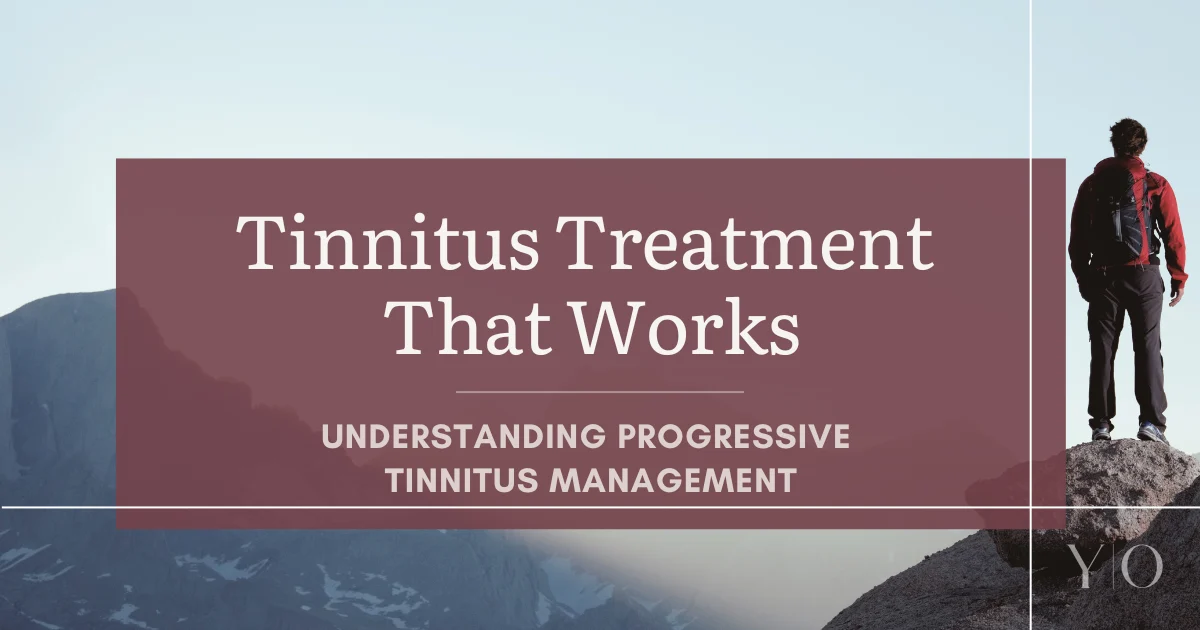Tinnitus is the ringing, buzzing, or hissing sound in your ears that no one else can hear can be deeply distressing, especially when it interferes with sleep, concentration, or everyday peace of mind. For some, it’s a mild nuisance. For others, it’s a constant, life-disrupting companion. The good news? Relief is possible.
Progressive Tinnitus Management (PTM) is a structured, evidence-based approach that helps reduce the impact of tinnitus and puts you back in control. Originally developed and widely used in Veterans Affairs (VA) and Department of Defense (DoD) clinics, PTM has helped thousands of individuals lead more peaceful, empowered lives even with tinnitus.
Table of Contents
What Is Progressive Tinnitus Management?
PTM isn’t about “getting rid of the sound,” it’s about changing your relationship with it. Over time, PTM helps you respond to tinnitus in a way that makes it feel less intrusive and less distressing.
This approach includes:
- Education to help you understand what tinnitus is and how it works
- Sound therapy to reduce the prominence of the sound
- Cognitive strategies to help shift unhelpful thinking patterns
- Relaxation tools to calm the nervous system and reduce reactivity
Together, these tools support your brain in naturally tuning out the sound, making tinnitus feel more manageable day by day.
The Step-by-Step PTM Process
One of the strengths of PTM is its tiered, personalized approach. You get the level of care that fits your needs, nothing more overwhelming than necessary, and nothing less than what’s helpful.
- Triage
It starts with a brief screening to rule out any medical issues (such as an ear infection or hearing loss) that could be treated directly. If no underlying issue is found, the focus shifts to tinnitus management. - Audiologic Evaluation
An audiologist assesses your hearing and discusses how sound and hearing changes may relate to your tinnitus. Hearing aids and other forms of sound support may be recommended. Just understanding more about what’s happening can significantly reduce anxiety and frustration. - Individualized Support
For those with persistent distress, one-on-one work with a mental health provider can be added. This often includes:
- Education: Knowledge helps reduce fear. Understanding how tinnitus works, why it feels louder when you’re stressed, and how your brain processes sound is empowering.
- Sound Therapy: Gentle background sounds, white noise, nature sounds, or hearing aid-delivered tones help your brain “retrain” and reduce focus on tinnitus.
- Cognitive Behavioral Therapy (CBT): You’ll learn how to shift thoughts like “This sound will drive me crazy” into more realistic and calming perspectives.
- Relaxation Skills: Practices like mindfulness, breathing exercises, and progressive muscle relaxation help your nervous system settle, making tinnitus less intense.
What Makes PTM Different?
PTM is not a one-size-fits-all treatment. It adapts to your level of distress and provides just the right amount of support. And most importantly, PTM empowers you. The goal isn’t perfection, it’s progress. Over time, you build confidence and skills that allow you to live a full and rich life, even with the sound still there.
Moving Toward Relief
Tinnitus can feel overwhelming, but it doesn’t have to take over your life. With time, practice, and the right guidance, it’s entirely possible to reduce the emotional weight of tinnitus and feel more at ease again.
Dr. Oren has extensive experience delivering Progressive Tinnitus Management (PTM) and has helped many individuals in Reno, Sparks, and Carson City find relief, peace, and renewed well-being. If you’re struggling with tinnitus and want to learn how PTM can help, don’t hesitate to reach out. You’re not alone; support is available and within reach.
Please note that the information provided in this blog post is for informational purposes only and is not intended as a substitute for professional therapy or mental health treatment.
Learn More: Expert Advice and References
- Harvard Health Publishing
Offers tips on managing tinnitus, such as treating underlying causes, practicing mindfulness, and maintaining a healthy lifestyle.
https://www.health.harvard.edu/diseases-and-conditions/tips-to-manage-tinnitus - Johns Hopkins Medicine
Explores tinnitus retraining therapy and other management options, including counseling and relaxation techniques.
https://www.hopkinsmedicine.org/health/conditions-and-diseases/tinnitus - National Center for Rehabilitative Auditory Research (NCRAR)
Provides an overview of Progressive Tinnitus Management, a stepped-care program involving coordinated care between audiology and behavioral health.
https://www.ncrar.research.va.gov/ClinicianResources/IndexPTM.asp - National Institute on Deafness and Other Communication Disorders (NIDCD)
Provides an overview of tinnitus, its symptoms, causes, and current management approaches.
https://www.nidcd.nih.gov/health/tinnitus - Mayo Clinic
Discusses various tinnitus management strategies, including hearing protection, sound therapy, and lifestyle modifications.
https://www.mayoclinic.org/diseases-conditions/tinnitus/diagnosis-treatment/drc-20350162 - Military Health System
Provides information for clinicians and technicians on implementing Progressive Tinnitus Management to assist individuals struggling with tinnitus.
https://www.health.mil/Military-Health-Topics/Centers-of-Excellence/HCE/Clinicians-Technician-Resources/Progressive-Tinnitus-Management - U.S. Department of Veterans Affairs
Highlights Progressive Tinnitus Management as a successful approach developed by the VA to help veterans manage the impact of tinnitus.
https://www.research.va.gov/research_in_action/Progressive-Tinnitus-Management.cfm



